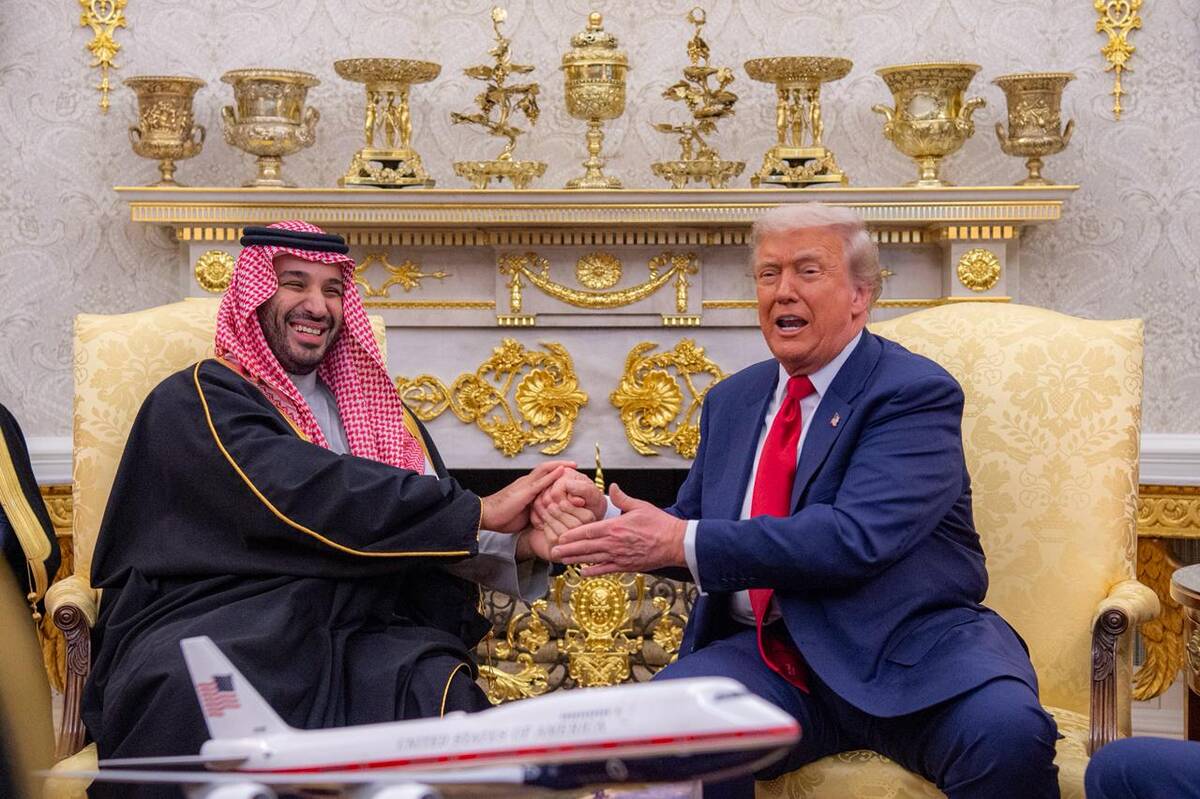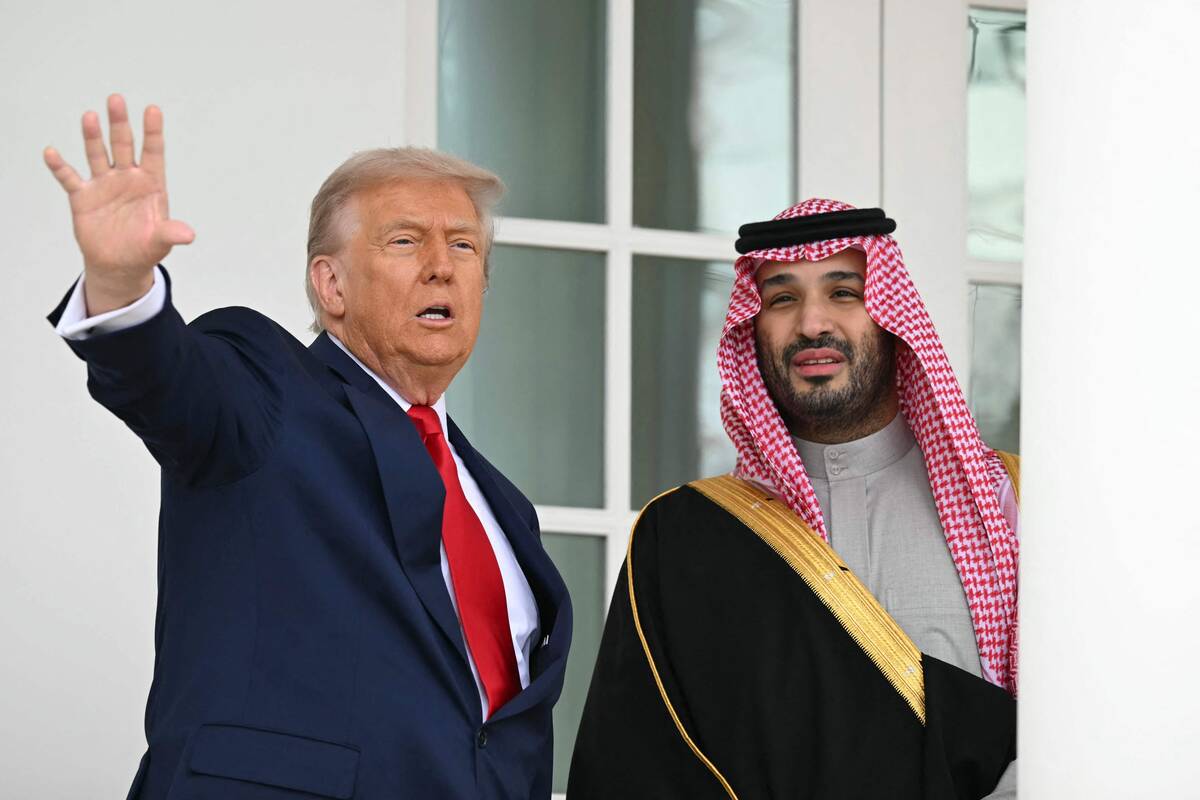WASHINGTON: Saudi Arabia is increasing its commitment to invest $600 billion in the US economy to up to $1 trillion, Crown Prince Mohammed bin Salman told US President Donald Trump at the White House on Tuesday.
The crown prince said Saudi collaboration with the US was creating real opportunities in artificial intelligence and that the relationship between the two countries is essential. He also acknowledged joint work in the fight against terrorism.
“We can announce that we are going to increase that $600 billion to almost $1 trillion for investment,” the crown prince said during a press briefing in the Oval Office.
President Trump asked him to confirm the figure, to which the crown prince replied: “Definitely.”
Earlier in the day, the Saudi crown prince and prime minister touched down in Washington DC to a lavish welcome, marking his first official visit to the US since 2018 and the first formal encounter between him and President Trump since the latter’s visit to the Kingdom in May.
The atmosphere around the White House was one of grand spectacle, signaling the deep personal and strategic ties the two men have fostered.
The crown prince’s visit is being seen as reaffirmation of an enduring partnership, which is being buttressed by a raft of deals in defense, nuclear energy and high-technology.
During the press briefing, President Trump lavished praise on Crown Prince Mohammed bin Salman, calling him “a good friend for a long time” and saying that it was “an honor” to have him at the White House. He described Saudi Arabia as a strong ally and important partner as he paid his respects to King Salman.
Tuesday’s events included a fly-by, a gun salute, and a gala dinner organized by First Lady Melania Trump to honor the Saudi crown prince, attended by Portuguese football legend Cristiano Ronaldo, who plays for Saudi side Al-Nassr.

Speaking on the nature of the visit, Trump told reporters aboard Air Force One on Friday: “We’re more than meeting … We’re honoring Saudi Arabia, the crown prince.”
At the heart of the bilateral discussions lies a mutual drive to strengthen the Saudi military’s capabilities and its strategy of economic diversification.
The most significant defense deal on the table is sale of advanced F-35 stealth fighter jets, which in the Middle East are currently only owned by Israel.
Despite objections reportedly voiced by Israeli officials, President Trump has made it clear he intends to proceed with the sale. “As far as I’m concerned, I think they are both at a level where they should get top of the line F-35s,” President Trump said in his remarks on Tuesday.
The push to sell this highly coveted jet to Saudi Arabia therefore represents a strategic shift in US arms export policy to the region.
Alongside the F-35s, deals on advanced air and missile defense systems are also expected to enhance the Kingdom’s security capabilities.
Another key announcement is a deal on a framework for civilian nuclear cooperation. During Tuesday’s press briefing, Trump indicated he would sign a deal with the Saudi crown prince on such a framework.
US media reports have said President Trump is considering giving assurances to Saudi Arabia that define the scope of US military protection, especially following the Sept. 9, Israeli strikes on Qatar, which since 2022 has enjoyed the status of a “major non-NATO ally.”
A presidential assurance, although not the equivalent of a comprehensive defense agreement ratified by Congress, would underscore the personal commitment of the current administration.
A key topic on the agenda is the question of normalization of Saudi relations with Israel — a move the US sees as essential to a wider Middle East peace deal following the war in Gaza.
In his first term, Trump helped forge commercial and diplomatic ties between Israel and Bahrain, Morocco, and the UAE through an effort dubbed the Abraham Accords.
Speaking in the Oval Office, the crown prince said the Kingdom wanted to normalize relations with Israel through the Abraham Accords, but first needed a “clear path” to Palestinian statehood to resolve the Palestinian-Israeli conflict.

“We want to be part of the Abraham Accords. But we want also to be sure that we secure a clear path of two-state solution,” he said.
“We’re going to work on that, to be sure that we can prepare the right situation as soon as possible,” he added.
Saudi Arabia is the home of two of Islam’s holy sanctuaries, Makkah and Madinah, making it central to the Islamic world and deeply invested in regional stability and Palestinian issues.
The Saudi government has maintained that a clear path toward Palestinian statehood must first be established before normalizing relations with Israel can be considered.
Asked by Arab News’ Editor-in-Chief Faisal J. Abbas where he believes the bilateral relationship is heading and how it fits into the bigger picture of the Kingdom’s strategic vision, the crown prince said the next chapter would bring huge opportunities.
“I don’t think it is a relationship that we can replace, from the Saudi side or the American side,” the crown prince responded.
“It is a critical relationship for our political tent, our economic tent, for our security, our military, for many things, and being there for nine decades.
“And the opportunities that we have today — it’s huge — and we’re seeing if that’s going to get deeper in the next few decades. And what we are having today and tomorrow with President Trump, it’s really a huge new chapter in this relationship that will add value to both of us.”
The crown prince’s visit is heavily focused on economics and the ongoing efforts to reshape the Saudi economy.

Saudi Arabia launched Vision 2030 almost a decade ago to diversify its economy away from oil by investing in sectors like culture, sports, technology and tourism.
A substantial component of the economic dialogue between Saudi Arabia and the US centers on cutting-edge technology.
This economic push will be spotlighted at a major investment summit at the Kennedy Center on Wednesday.
The event is slated to include the heads of major Saudi and American corporations, including Salesforce, Qualcomm, Pfizer, the Cleveland Clinic, Chevron and Aramco, Saudi Arabia’s national energy company.
This forum is expected to be the venue for the announcement of even more deals.

